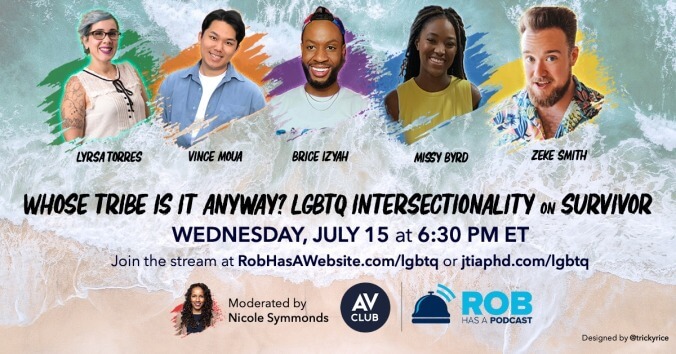Survivor's Zeke Smith reflects on being outed as transgender—and what should have been different

In an an emotional 90-minute conversation Wednesday, five Survivor alums gathered virtually to discuss what it is like to be an LGBTQ minority on the CBS reality competition series. “If you walk in your own truth, you won’t mind how I walk in mine,” Survivor: Island of the Idols’s Missy Byrd said about feeling like an “other” both among the cast and behind the scenes. Byrd was joined on the panel—which was organized by the Soul Survivor Organization and hosted by Rob Has A Podcast in partnership with The A.V. Club.—by her season 39 castmate Vince Moua, Brice Izyah (Survivor: Cagayan, season 28), Zeke Smith (Survivor: Millennials vs. Gen X, season 33 and Survivor: Game Changers, season 34), Lyrsa Torres (Survivor: David vs. Goliath, season 37). “We’re doing this so a little kid who looks like me doesn’t feel like they’re the only one,” Izyah said of calling for more diversity both in front of and behind the camera. “I want them to have a better experience.”
Though he is a minority as a transgender person, Zeke Smith spoke at length on Wednesday about how his privilege as a white man played a role in how his story was told when he was outed by another contestant during his second stint on the show:
I both played the game and was treated afterwards with an abundance of white-male privilege…. I think that because the show was unequivocally made through a white male lens…. I mean, [CBS] is not a network that, I think, can have a critical look at at stories outside of what they think is going to make a Midwestern mom comfortable. And I think that’s the lens through which Jeff [Probst, host and executive producer,] makes the show. I remember in our conversations trying to make sense of what was about to happen to me. He was saying, ‘You know, it’s going to be okay. I’ve shown my mom the episode, and my mom is my barometer of how the rest of the world will react. And she likes you.” And nothing against Jeff’s mom, she’s a wonderful lady…but I do think that shows how limited [the show] is.
I wonder if my story would have had the same impact that it had in opening people’s minds to transgender people if I were a Black trans woman… I think that not being visibly trans provided me a lot of cover in my first season. I think that if I was not white, if I was more femme presenting, if it was known that I was trans, I think I would have been the first person voted out at the Millennials tribe.








![HBO teases new Euphoria, Larry David, and much more in 2026 sizzle reel [Updated]](https://img.pastemagazine.com/wp-content/avuploads/2025/12/12100344/MixCollage-12-Dec-2025-09-56-AM-9137.jpg)































